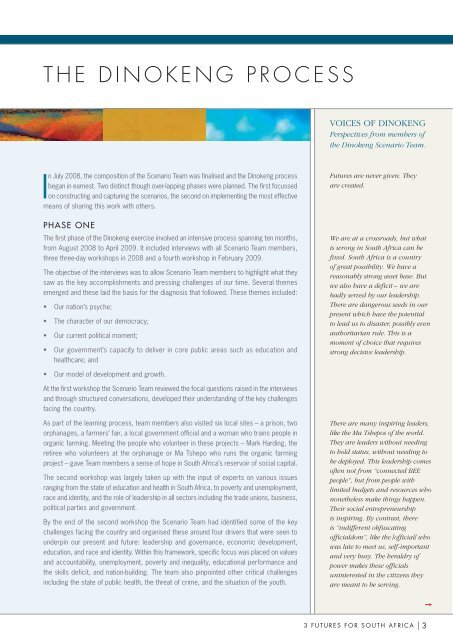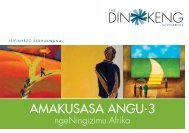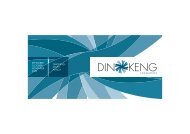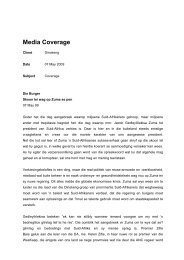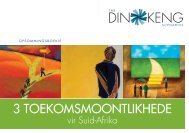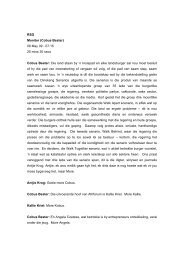Dinokeng Scenarios
Dinokeng Scenarios
Dinokeng Scenarios
Create successful ePaper yourself
Turn your PDF publications into a flip-book with our unique Google optimized e-Paper software.
THE DINOKENG PROCESS<br />
VOICES OF DINOKENG<br />
Perspectives from members of<br />
the <strong>Dinokeng</strong> Scenario Team.<br />
In July 2008, the composition of the Scenario Team was finalised and the <strong>Dinokeng</strong> process<br />
began in earnest. Two distinct though over-lapping phases were planned. The first focussed<br />
on constructing and capturing the scenarios, the second on implementing the most effective<br />
means of sharing this work with others.<br />
Futures are never given. They<br />
are created.<br />
PHASE ONE<br />
The first phase of the <strong>Dinokeng</strong> exercise involved an intensive process spanning ten months,<br />
from August 2008 to April 2009. It included interviews with all Scenario Team members,<br />
three three-day workshops in 2008 and a fourth workshop in February 2009.<br />
The objective of the interviews was to allow Scenario Team members to highlight what they<br />
saw as the key accomplishments and pressing challenges of our time. Several themes<br />
emerged and these laid the basis for the diagnosis that followed. These themes included:<br />
• Our nation’s psyche;<br />
• The character of our democracy;<br />
• Our current political moment;<br />
• Our government’s capacity to deliver in core public areas such as education and<br />
healthcare; and<br />
We are at a crossroads, but what<br />
is wrong in South Africa can be<br />
fixed. South Africa is a country<br />
of great possibility. We have a<br />
reasonably strong asset base. But<br />
we also have a deficit – we are<br />
badly served by our leadership.<br />
There are dangerous seeds in our<br />
present which have the potential<br />
to lead us to disaster, possibly even<br />
authoritarian rule. This is a<br />
moment of choice that requires<br />
strong decisive leadership.<br />
• Our model of development and growth.<br />
At the first workshop the Scenario Team reviewed the focal questions raised in the interviews<br />
and through structured conversations, developed their understanding of the key challenges<br />
facing the country.<br />
As part of the learning process, team members also visited six local sites – a prison, two<br />
orphanages, a farmers’ fair, a local government official and a woman who trains people in<br />
organic farming. Meeting the people who volunteer in these projects – Mark Harding, the<br />
retiree who volunteers at the orphanage or Ma Tshepo who runs the organic farming<br />
project – gave Team members a sense of hope in South Africa’s reservoir of social capital.<br />
The second workshop was largely taken up with the input of experts on various issues<br />
ranging from the state of education and health in South Africa, to poverty and unemployment,<br />
race and identity, and the role of leadership in all sectors including the trade unions, business,<br />
political parties and government.<br />
By the end of the second workshop the Scenario Team had identified some of the key<br />
challenges facing the country and organised these around four drivers that were seen to<br />
underpin our present and future: leadership and governance, economic development,<br />
education, and race and identity. Within this framework, specific focus was placed on values<br />
and accountability, unemployment, poverty and inequality, educational performance and<br />
the skills deficit, and nation-building. The team also pinpointed other critical challenges<br />
including the state of public health, the threat of crime, and the situation of the youth.<br />
There are many inspiring leaders,<br />
like the Ma Tshepos of the world.<br />
They are leaders without needing<br />
to hold status, without needing to<br />
be deployed. This leadership comes<br />
often not from “connected BEE<br />
people”, but from people with<br />
limited budgets and resources who<br />
nonetheless make things happen.<br />
Their social entrepreneurship<br />
is inspiring. By contrast, there<br />
is “indifferent obfuscating<br />
officialdom”, like the [official] who<br />
was late to meet us, self-important<br />
and very busy. The heraldry of<br />
power makes these officials<br />
uninterested in the citizens they<br />
are meant to be serving.<br />
➙<br />
3 FUTURES FOR SOUTH AFRICA 3


